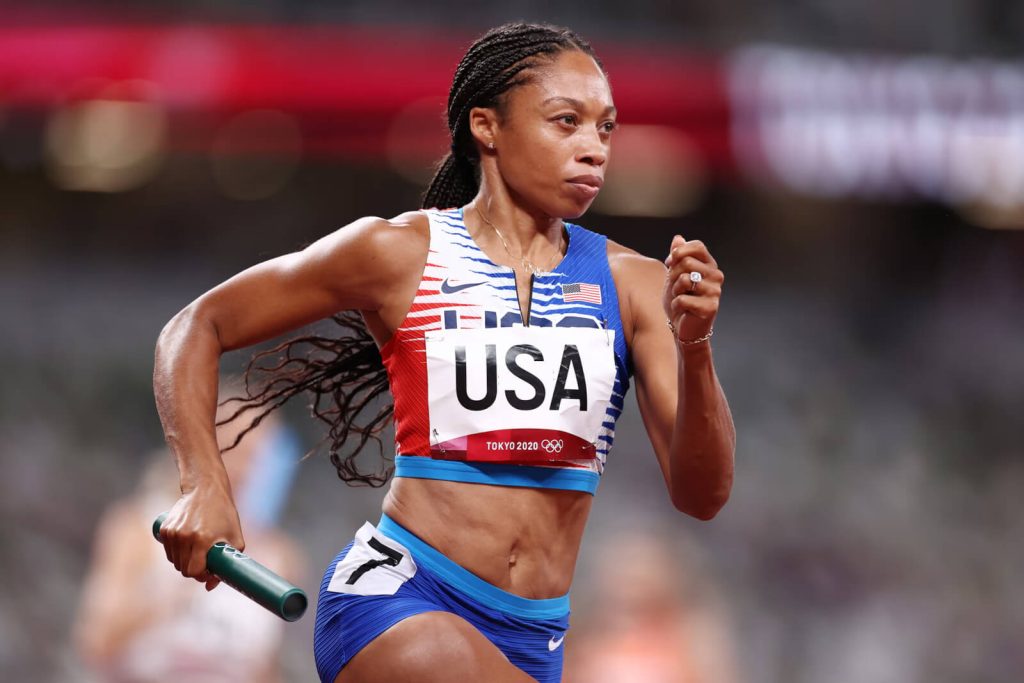Allyson Felix, the most decorated U.S. track and field athlete in Olympic history, has transitioned from her illustrious athletic career to becoming a prominent advocate for maternal health, particularly for women of color.
Felix won her final Olympic gold medal in the women’s 4x400m relay at the Tokyo 2020 Games (held in 2021), bringing her total to eleven Olympic medals, including seven golds, over five consecutive Games. Reflecting on her final gold medal, Felix stated, “Although my mindset was completely dialled in to the task at hand, I also knew that I was running for a bigger purpose.”
In 2018, at 32 weeks pregnant, Felix was diagnosed with severe pre-eclampsia, leading to an emergency caesarean section. Her daughter, Camryn, was born weighing just over 2kg (4lb 8oz) and spent a month in neonatal intensive care. Felix recounted, “I was unsure if I was going to make it. If I was ever going to hold my precious daughter.”
This experience prompted Felix to become vocal about maternal health disparities. I think that being an Olympic athlete I took my health for granted,” Felix says. Even throughout my pregnancy.” She adds, “You just don’t imagine these complications happening to a top athlete.” Recognizing the broader implications, Felix noted, “So many women of colour have a similar story and I really wanted to be part of a solution.
In May 2019, Felix testified before a House of Representatives committee on maternal health and mortality. She described it as “the most terrifying two days of my life” and emphasized the need for healthcare providers to take Black women’s health seriously during pregnancy.
The death of her teammate and friend, Tori Bowie, in April 2023 further reinforced Felix’s commitment to this cause. She called it “devastating” and wrote in Time magazine, “We’re dealing with a Black Maternal Health crisis. Here you have three Olympic champions, and we’re still at risk … I would love to have another child. That’s something that I know for sure. But will I be here to raise that child? That’s a very real concern. And that’s a terrifying thing.”
Felix has also challenged the sports industry’s treatment of pregnant athletes. In 2019, she confronted Nike, her longtime sponsor, over their maternity policy. I felt like from a marketing perspective, Nike always told these stories about supporting women,” she says. “And I was disappointed, because I didn’t want to leave the company. I never intended to do that.”
In an op-ed for the New York Times, Felix wrote: “I asked Nike to contractually guarantee that I wouldn’t be punished if I didn’t perform at my best in the months surrounding childbirth. I wanted to set a new standard. If I, one of Nike’s most widely marketed athletes, couldn’t secure these protections, who could?
Post-retirement, Felix has launched her own footwear company, Saysh, and continues her advocacy work. She views this phase not as retirement but as a pivot: “I’ve just pivoted to something else. I’m retired from competing professionally, but I feel like I’m just in the next phase of my life. I feel busier than ever; I’m doing work that I feel really moved by and engaged with.”
Reflecting on her career, Felix says, “I never grew up wanting to be an Olympic athlete, or even an athlete at all. I wanted to be a teacher, and sometimes I think that it would have been a much simpler life. I’ve never been one to really crave the limelight or to enjoy those things. But then I look at the opportunities I’ve been able to have, and being able to see the world, and I know that I would never have been able to do that without the sport I love. And I always come back to being really thankful for the experiences that I’ve had.
Felix’s journey from Olympic champion to maternal health advocate underscores the ongoing challenges faced by women, particularly women of color, in both professional sports and healthcare. Her story serves as a powerful testament to the importance of using one’s platform to effect positive change in society.











I was just as captivated by your creations as I was. The drawing you’ve created is stunning, and the writing you’ve done is sophisticated. However, your remarks indicate that you are worried about the possibility of engaging in something that may be seen as dubious. I’ll be able to resolve this quickly.